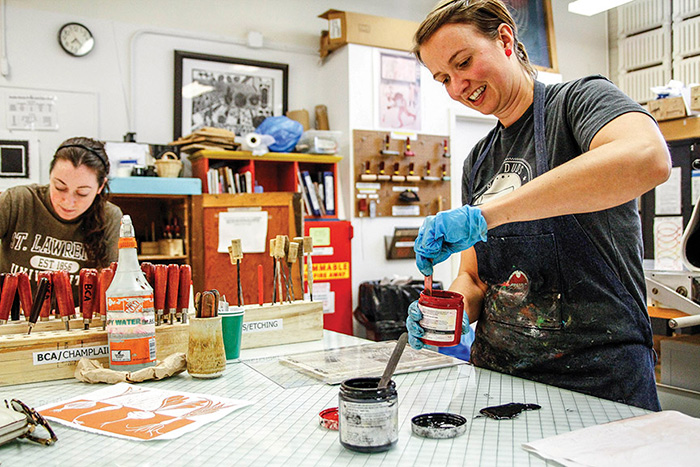| Doreen Kraft – Champion of Burlington City Arts | ||||||||
| by Cynthia Close | ||||||||
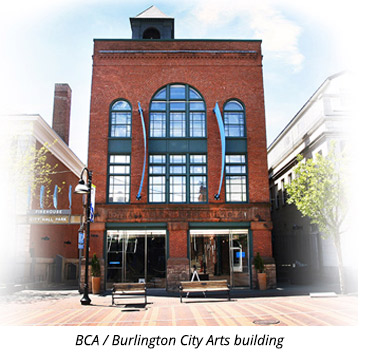 |
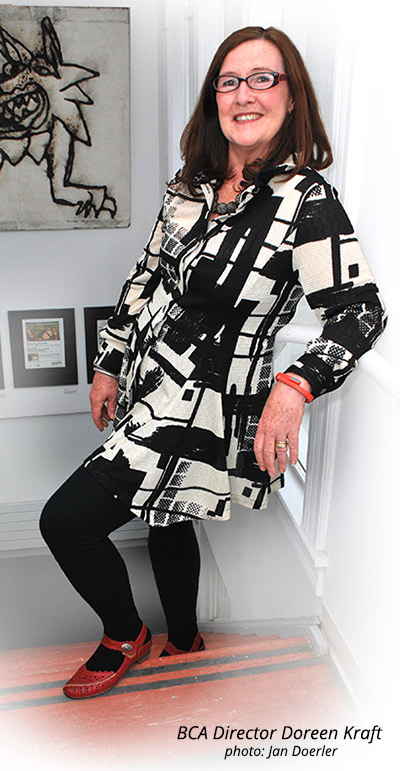 |
|||||||
|
||||||||
Doreen Kraft began her journey in arts administration in 1983, in an office squeezed inside a janitor’s closet in the basement of city hall. She was the first paid, part-time staff person for the Mayor’s Arts Council (MAC), originally an all-volunteer organization established in 1981 by then mayor Bernie Sanders. The mission of MAC was to “make the arts available to all, regardless of social, economic or physical constraints,” which remains a guiding principle of Burlington City Arts (BCA) today. Early on, festivals and concerts were seen by MAC as a vehicle to bring the arts to the people rather then keeping visual arts, music, and other cultural activities tucked away in the rarified and sometimes intimidating atmosphere of museums, concert halls, and galleries. The Battery Park Free Concert Series was started back then and continues today along with the Discover Jazz Festival, which was initiated through a partnership with the Flynn Center. This year the festival celebrates its 32nd anniversary of bringing jazz to Vermont audiences. |
||||||||
| These events reflected a spirit of community that was at the heart of MAC’s original mandate. The building of relationships between artists and the cultural organizations that supported them soon began to catch the attention of the world outside Vermont, and in 1988 the US Conference of Mayors cited Burlington as “one of the most livable cities for the arts.”
In 1990, the city council amended the city charter to change the name from MAC to Burlington City Arts. The structure of BCA is unique in that it adheres to both a traditional nonprofit model with a governing board of directors but is also a department of the city, whose activities are overseen by the city council and ultimately the mayor. BCA’s funding comes in part from the city, which covers 40 percent of the overall budget, including salaries and overhead. But fundraising is needed to support its programs. This balance requires an executive director skilled in the ways of politics as well as someone with a passion and belief in the ability of the arts to stimulate economic development, facilitate learning, and influence urban design. In 1995 Kraft officially became executive director, and BCA found in her the leadership and passion as well as the ability to grow as the mission of the organization grew. Fundraising is the never-ending task of any leader of a nonprofit organization. It is often responsible for early burnout and constant staff turnover, and when unsuccessful, it can mean the death of the organization. How does Kraft manage to do this most difficult task, year after year? She gives us a clue when she tells me she wears a button stating “I Believe in Magic” when visiting potential donors. A positive outlook is appealing and convincing; it encourages people to join your cause. By the early 1990s, BCA was tasked with managing city facilities, such as Contois Auditorium in City Hall and the moribund Memorial Auditorium, along with developing and administrating an active, year-round arts program. The organization had outgrown the janitor’s closet, and in 1995 BCA won permission from the city to convert the ground floor of the former Ethan Allen Firehouse, built in 1889 by local architect A.B. Fisher, into a gallery for the visual arts. By 1998 BCA had renovated the second floor into studio and classroom space. In 1999 the entire firehouse building was converted into a visual arts center, and by 2001 Kraft was finally able to move the administrative offices out of the basement of city hall.
|
||||||||
 |
| Street performer Mama Lou rips a phone book in half to the amazement of the crowd during the 2014 Festival of Fools. photo: Raychel Severance |
Following her adventures in Haiti, Kraft went on to make several films in Nicaragua. Dawn of the People: Nicaragua’s Literacy Crusade was written and directed by Kraft and fellow Vermont filmmaker Jay Craven, with a voice-over narration by Ossie Davis. The film explores the post-Sandinista Revolution’s 1980 literacy crusade that “the United Nations called the most important social movement of its generation” (quote from the Green Valley Media website).
Partially as a result of that film, there was an interest in Burlington to have a “sister city” in Nicaragua. Puerto Cabezas, a vital port town on Nicaragua’s Atlantic Coast, was chosen. Kraft along with another Vermont filmmaker, Marvin Fishman, directed the 32-minute award-winning video Puerto Cabezas: Our Sister City. The film brought home an awareness of the desperate need for humanitarian aid in Nicaragua; the result of the impact of the US-backed Contra War (1981–1989).
Kraft next decided to make a film in recognition of her Irish Catholic mother, who came to this country at the age of 14, with her nine siblings. In 1988, Kraft won a $15,000 award to make the film, a sort of Irish “roots” ancestral journey. She took her mother back to Ireland, and they visited the convent school where some of the nuns who had taught her mother were nearing 100 years old.
Making independent films is often a difficult and expensive task. Sometimes projects languish, as is the case with this “docudrama” about the life story of Kraft’s mother. It remains untitled and unfinished. Perhaps she will find the time some day to return to it as part of her own memoir.
Both Lloyd and Kraft were smart enough to know that just making films with a socially responsible mission was not enough. If the films were not readily available, they would not have an impact, so in 1974 they started their own distribution company. Green Valley Media is a nonprofit film and video production and distribution company where you can order copies of Kraft’s films along with the work of Lloyd and other media activists.
Lloyd was the founding member of Burlington’s Peace and Justice Center and currently serves on the advisory board of the Vermont International Film Foundation (VTIFF). She is still the director of Green Valley Media. Kraft serves as the president of Green Valley’s board of directors.
Kraft sees film as part of the magic in connecting to people, and she recently sponsored, along with Green Valley Media, a film restoration grant that has sparked the formation of the Vermont Archive Movie Project (VAMP), which is now under the umbrella of the VTIFF.
One of the first things Kraft talked about during her interview was her excitement in being a part of the Women’s Leadership Circle. This is a project initiated by Kerry Secrest, founder of Watershed Coaching, now partnering with Marlboro College Graduate School. Women interested in strengthening their leadership abilities apply for a six-month period of guided meetings where they define their goals, learn to listen, and think about the meaning of good, effective leadership in holistic terms. Kraft’s obvious enthusiasm for this program was a clue to understanding her own continued success as a leader in the arts and cultural sector here in Vermont; she respects and is willing to learn from others whose approach may be different than her own. The women who participate in the program form bonds of support and inspiration, meeting regularly after the program is over.
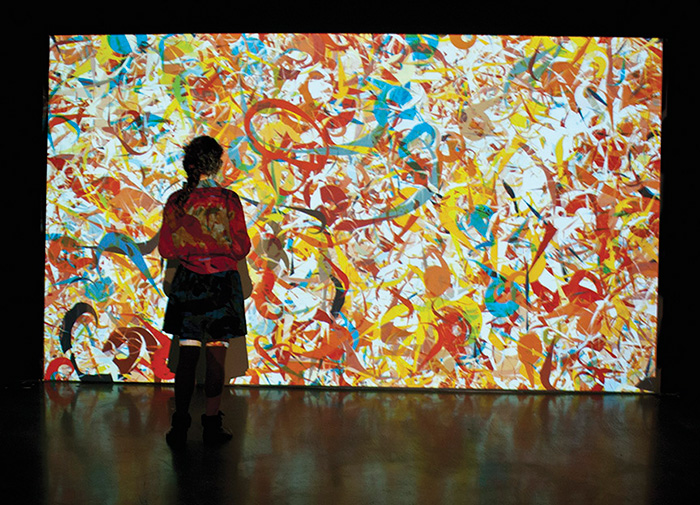 |
| A BCA Center visitor checks out animated projections from software artist Casey Reas in 2012. photo: Ted Olson. |
Kraft believes that artists have power, but they must be engaged. She is also pragmatic and knows that good data drives good development. She understands the importance of failure both in science and the arts, that failure drives learning. It is logical then that she now serves on the board of directors for Generator, the new “home to engineers, hobbyists, entrepreneurs, artists, crafters, teachers and enthusiasts” providing “access to a growing suite of fabrication and prototyping tools—and an incredible community of camaraderie and creativity” (quotes from the Generator website). Generator is housed in Memorial Auditorium.
Kraft spoke at its one-year anniversary in March 2015 about the power of collaboration to advance innovation and entrepreneurship and continuing engagement in partnerships for growth.
Collaboration and partnerships are all part of Kraft’s path to successful leadership. The many activities and programs now offered by BCA are impressive, and the staff has grown from that initial part-time position in the basement to 18 people, including Kraft as executive director. Exhibitions, educational programs, and artist-support services are an important part of BCA. DJ Hellerman is the chief curator and director of exhibitions. He has three support staff who assist in putting on challenging, often cutting-edge exhibits throughout the year.
Artists in Vermont have a robust system of resources at BCA, including the Summer Artist Market held outdoors Saturdays in City Hall Park, the artist database, and the Artist-in-Residence Program. The innovative Art Sales and Leasing Program is managed by Director Kerri Macon, who also curates shows, targeted to collectors, in the fourth floor Metro Gallery. The program manages exhibits in the City Hall Gallery, the UVM Medical Center, the Marriott Courtyard, the Airport Gallery, the Maltex building, and the Hilton Garden Inn, largely drawn from the BCA artist database.
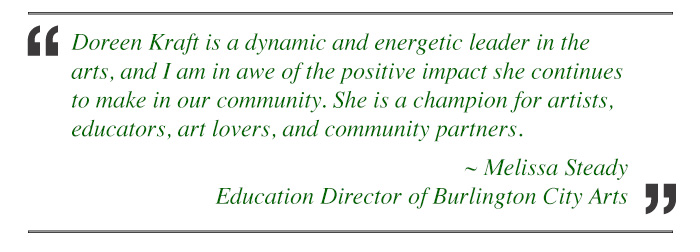 |
Melissa Steady, BCA’s education director, works closely with Kraft as the education mandate is woven through much of BCA programming. Steady had this to say about her boss: “I’ve had the privilege to work closely with Doreen for over 10 years. She is a dynamic and energetic leader in the arts, and I am in awe of the positive impact she continues to make in our community. She is a champion for artists, educators, art lovers, and community partners, and she cares deeply about connecting with people and listening to their feedback. She has a wonderful sense of humor and as a manager; she pushes our BCA team to strive for excellence, to take creative risks, and to enjoy the work we do. Her endless energy, positive support, and passion for the arts and our community inspires me to work hard, and I am so proud of the wide variety of high-quality, accessible, and affordable programming that Burlington City Arts currently offers. Under Doreen’s leadership, I am very excited to see what the next 10 years will bring.”
Sara Katz is the assistant director of BCA. She reflected similar views about working with Kraft: “Doreen is one of the most compassionate, thoughtful people I’ve ever met. She cares deeply about anyone with whom she has a relationship, and anyone who has a relationship to BCA—sometimes that seems like everyone! She takes the health and well-being of her staff very seriously . . . She is tireless—a woman who has often had to fight her way through a ‘man’s world,’ but does not see the world as divided between men and women at all and is at the same time a total feminist. The world around her is constantly changing, and she is right there ready to change with it. I think of her as the ultimate social activist who sees the arts as the best method for improving people’s lives. In short, she is an incredible role model and a good friend.”
Doreen Kraft has had a positive impact on the quality of life in Burlington and beyond through her passionate belief in the power of the arts to help us all be better human beings. Her energy seems to increase as she faces new challenges inherent in growth and development. As the city moves forward with planBTV South End, Kraft will most certainly be there, listening and learning to ensure that art and the artists who make it will not be forgotten. ![]()
Cynthia Close is a contributing editor to Documentary Magazine and art editor of the literary journal Mud Season Review. She is a co-organizer of the Burlington Writers Workshop and lives in Burlington with her 110-pound “puppy,” Ethel.
